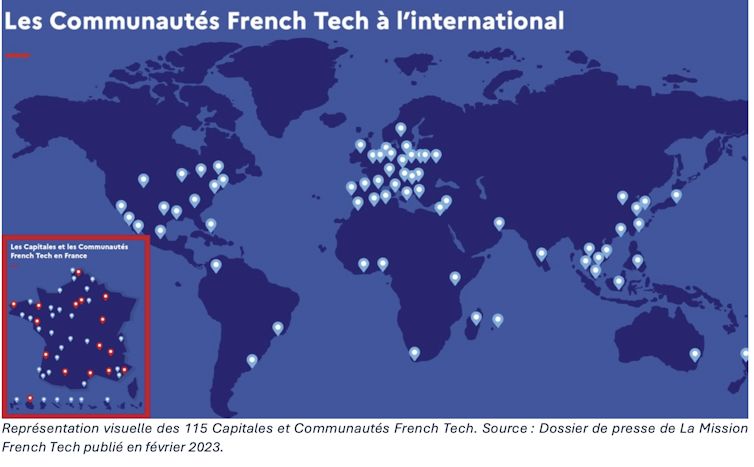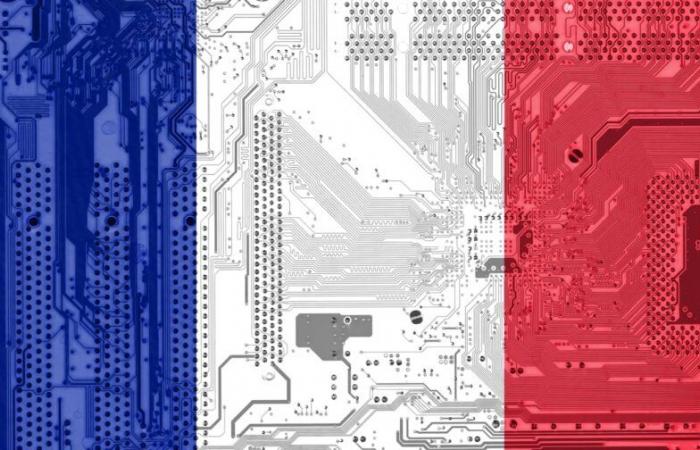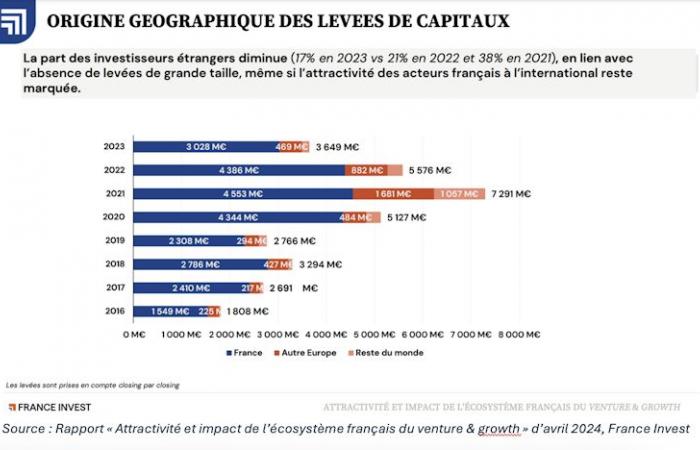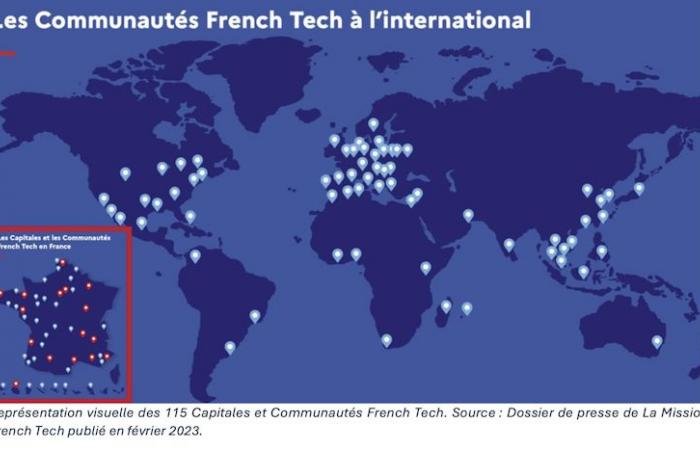Since its creation in 2013, under François Hollande, French Tech has been deployed as a real tool in favor of French innovation. If tricolor unicorns remain too rare a species, the initiative taken up and amplified has had many effects, some of which were unexpected.
“La French Tech”, or the public policy aimed at developing a “French movement of innovative technological start-ups”, has just celebrated its 10th anniversary. A great opportunity to review the results and prospects of this initiative. When it was born, in 2013, the objective of La French Tech was to “do everything so that the next Googles are born and develop here, in France and in Europe!” “.
Ten years later, if the flag of La French Tech brings together several tens of thousands of start-ups, spread across 114 “communities” and “capitals” in France and internationally, it is clear that some regret the lack of French champions. Between initial expectations and the evolution over time of this public policy, French Tech today presents interesting results for the French entrepreneurial ecosystem… which are probably not where we expected them.
Bringing out “Tech champions”
French Tech does not intend to stimulate the creation of any type of business. Its focus is on start-ups, young innovative companies based on the use of new technology, the prospect of strong growth and a significant need for financing. French Tech is part of a Schumpeterian vision of the economy, which makes innovation the “spur” of economic growth and the entrepreneur the “trigger” of technological change. It carries an ambitious speech, which aims to bring out “international champions”, “Tech Champions”, “world-class start-ups” to make France a “Start-up Nation”.
If French Tech aspires to encourage the creation and growth of start-ups, this public policy above all labels territories. A strategy of territorialization of public action is chosen, carried out by a “French team of metropolitan digital ecosystems”. The objective is then to irrigate the French territory, so that we encourage the creation of start-ups locally, while strengthening the image of France internationally.
A policy of territorialization
French Tech is not the first government initiative to rely on the territorialization of public action in terms of innovative entrepreneurship. Several public interventions had already led – among others – to the creation of competitiveness clusters in 2004, technological research institutes (IRT) in 2011, or even technology transfer acceleration companies (SATT) in 2012.
This is not the first European initiative of its kind either. At the beginning of the 2010s, many governments around the world chose public policies aimed at supporting innovative entrepreneurship, such as, for example, the “Tech City” in the United Kingdom in 2010, “Industry 4.0 » in Germany in 2011 or the “Italian Startup Act” in Italy in 2012. The filing with the INPI of the public brand “La French Tech” and the publication in November 2013 of the presentation file of La French Tech sign the start of French state intervention, focused on three levers of intervention: the mobilization of metropolitan ecosystems, the acceleration of the growth of start-ups and the strengthening of France’s international attractiveness.
Start-ups, a nation… But no “start-up nation”
It is interesting to observe a significant evolution of La French Tech in its content and practices, moving from an initiative focused on “Tech Champions” to the creation of an open dynamic, intended to be unifying rather than selective. Over time, French Tech has become the noun of the French innovative entrepreneurial ecosystem: beyond a public policy, “French Tech” also designates all French start-ups and actors who revolve around their growth.
Read more:
La French Tech, agile mais encore fragile
Therefore, it is clear that the “Tech” of “French Tech” today refers to multiple realities. French Tech is not limited to start-ups experiencing the strongest growth (e.g.: the “Next 40/120” start-ups) or the highest valuations (e.g.: the 30 French “unicorns” valued at more than billion euros in 2024). These companies, destined to become “international leaders”, also represent a tiny part of the 27,730 start-ups identified by La French Tech in 2024.
French Tech is not content with simply stimulating the development of radical and disruptive innovations (e.g. “Deep Tech”). Instead, the choice is made for a policy of openness, which can affect all sectors (e.g.: “GreenTech”, “AgriTech”, “Health Tech”, etc.), all types of innovation (from the most frugal to the most radical) and all entrepreneurs.
A Franco-French ecosystem
The disparity of start-ups created, federated, supported and/or stimulated by La French Tech in terms of innovation is perhaps exacerbated by the gap between the discourse carried by the public actor (“Supporting the development of technological companies of world rank capable of providing solutions to major societal issues”) and the reality of the French entrepreneurial ecosystem… which still remains Franco-French.
In 2016, the share of capital raised in venture capital in the French entrepreneurial ecosystem by foreign investors represented 14.3% of the 1.808 billion euros raised. In 2023, seven years later, they represented 17% of the 3.649 billion euros raised. If progress is real, we remain far from marked and continuous internationalization. We also note that fundraising remains carried out, in very large proportions, by French institutional players (92% of fundraising in 2023), like BPI France, one of the historic operators of La French Tech.
A stimulated entrepreneurial culture
However, today we are seeing tangible results for the French entrepreneurial ecosystem, which was still “in its infancy” in 2013 and presented as “a country with a weak entrepreneurial culture”. It first acquired a public brand, particularly visible internationally – notably during trade shows such as the CES in Las Vegas, the WebSummit in Lisbon or VivaTech in Paris – and among players in France. (metropolises, regions, incubators and accelerators, etc.).
The entrepreneurial ecosystem then expanded, gradually relying on a network of 48 “French Tech Capitals” and “French Tech Communities” in the territory, and 66 “International French Tech Communities” around the world. . It has also grown, going – among other things – from 9,400 start-ups listed in 2016 to more than 27,730 in 2024. That’s almost a tripling!
It finally mobilized, no longer in the form of opposition to the public actor – crystallized successively by the “pigeon movement”, the intervention of the Minister of the Economy to cancel the takeover of Dailymotion by Yahoo, then the “Entrepreneurship Conference” – but in the animation of a collective movement, designed for and by entrepreneurs.

A real flag
Obviously, the real success of La French Tech does not lie in establishing France as a “start-up Nation” – a term that is probably overused, misused and overused. Nor is it through the explosion in the number of its “Tech Champions” that La French Tech stands out, ten years after the launch of this public policy.
On the other hand, the public brand “La French Tech” has become the standard bearer of the French innovative entrepreneurial ecosystem. Through this umbrella brand, La French Tech seems to succeed in making the interests of entrepreneurs and the State coexist, making them not only complementary but also interdependent. While the State plays the role of an inspiring and catalyzing State for the activity of the French “Tech” entrepreneurial scene, entrepreneurs become true ambassadors of French Tech. A positive sum game has been created between entrepreneurs and the State which allows the public actor to stimulate the dynamism of French start-ups – in a logic of international race for sovereignty –, and for entrepreneurs to benefit from Incentive instruments that are valued by the entire entrepreneurial ecosystem.
Although the leverage effect of La French Tech remains difficult to measure, the appropriation and massive rallying of ecosystem players to the “La French Tech” brand maintains the dynamism of the French innovative entrepreneurial scene. In the evolution and success of La French Tech, the most important thing perhaps remains the creation of a collective dynamic, sufficiently unifying to continue to be supported by both the State and entrepreneurs, ten years after its creation. creation.








